Blank Celebration
[Revolver, May 2001. Words: J. D. Considine. Pictures: Anton Corbijn.]
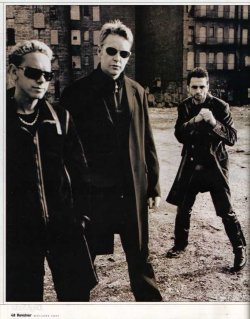
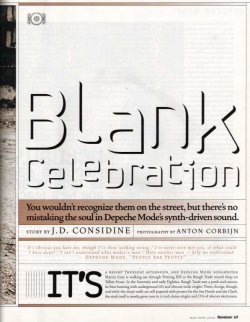
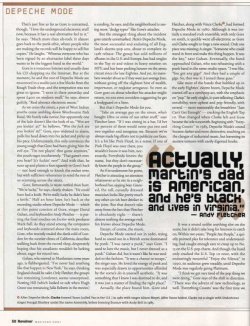
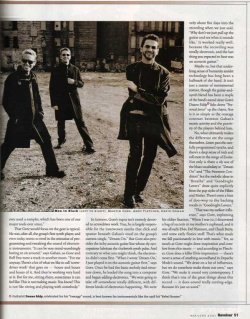
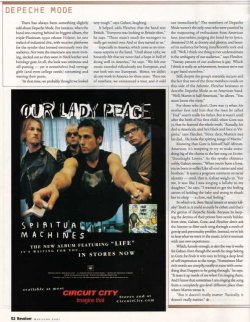
It's a bright Thursday afternoon, and Depeche Mode songwriter Martin Gore is walking me through Notting Hill to the Rough Trade record shop on Talbot Street. In the Seventies and early Eighties, Rough Trade was a punk rock mecca, its bins bursting with underground LPs and obscure indie singles. Times change, though, and while the shop's walls are still papered with posters for the Sex Pistols and the Clash, the stock itself is mostly given over to 12-inch dance singles and CDs of obscure electronica.
That's just fine as far as Gore is concerned, though. "I love the underground electronic stuff now, because it has a real alternative feel to it," he says. "Much more than alt-rock. It almost goes back to the punk ethic, where people who are making the records will be happy to sell five copies." He laughs. "Whereas everyone who has been signed by an alternative label these days wants to be the biggest band in the world."
Gore is a voracious listener and usually does his CD shopping via the Internet. But at the moment, he and the rest of Depeche Mode are ensconced in a studio just a few blocks from the Rough Trade Shop, and the temptation was too great to ignore. "I went in there yesterday and spent ?400 on modern stuff," he says, almost guiltily. "Real abstract electronic music."
As we cross the street, a pair of West Indian youths come ambling down Westbourne Park Road. We barely take notice, but apparently one of the lads doesn't like the look of us. "Wot are you lookin' at?" he bellows. "Wot the fuck are you lookin' at?" Gore, eyes widened in alarm, pulls his head down into his jacket and picks up his pace. Unfortunately, this only convinces the young tough that Gore had been giving him the evil eye. "I'm not playin' that game anymore," the youth rages incoherently. "That game's over, you hear? It's fuckin' over!" And with that, he runs up and plants a foot squarely in Gore's back - not hard enough to knock the rocker over, but with sufficient vehemence to send the two of us scurrying across the street.
[Revolver, May 2001. Words: J. D. Considine. Pictures: Anton Corbijn.]
Easy-reading article in a US magazine surrounding the release of Exciter. The author muses on their rise to fame in the USA, the origins of their style, and the bizarre way in which the band members individually remain nondescript despite the success of the band as a whole. An article that manages to strike the balance between content and interest.
" Fletcher is attracting no attention whatsoever as he sits in a neighbourhood bar, sipping beer. Granted, the tall, casually dressed musician looks pretty much like any other 40-ish beer drinker in the joint. But that doesn't take away from the fact that Fletcher is absolutely right - there's almost nothing the average rock fan knows about Depeche Mode. "





It's a bright Thursday afternoon, and Depeche Mode songwriter Martin Gore is walking me through Notting Hill to the Rough Trade record shop on Talbot Street. In the Seventies and early Eighties, Rough Trade was a punk rock mecca, its bins bursting with underground LPs and obscure indie singles. Times change, though, and while the shop's walls are still papered with posters for the Sex Pistols and the Clash, the stock itself is mostly given over to 12-inch dance singles and CDs of obscure electronica.
That's just fine as far as Gore is concerned, though. "I love the underground electronic stuff now, because it has a real alternative feel to it," he says. "Much more than alt-rock. It almost goes back to the punk ethic, where people who are making the records will be happy to sell five copies." He laughs. "Whereas everyone who has been signed by an alternative label these days wants to be the biggest band in the world."
Gore is a voracious listener and usually does his CD shopping via the Internet. But at the moment, he and the rest of Depeche Mode are ensconced in a studio just a few blocks from the Rough Trade Shop, and the temptation was too great to ignore. "I went in there yesterday and spent ?400 on modern stuff," he says, almost guiltily. "Real abstract electronic music."
As we cross the street, a pair of West Indian youths come ambling down Westbourne Park Road. We barely take notice, but apparently one of the lads doesn't like the look of us. "Wot are you lookin' at?" he bellows. "Wot the fuck are you lookin' at?" Gore, eyes widened in alarm, pulls his head down into his jacket and picks up his pace. Unfortunately, this only convinces the young tough that Gore had been giving him the evil eye. "I'm not playin' that game anymore," the youth rages incoherently. "That game's over, you hear? It's fuckin' over!" And with that, he runs up and plants a foot squarely in Gore's back - not hard enough to knock the rocker over, but with sufficient vehemence to send the two of us scurrying across the street.
